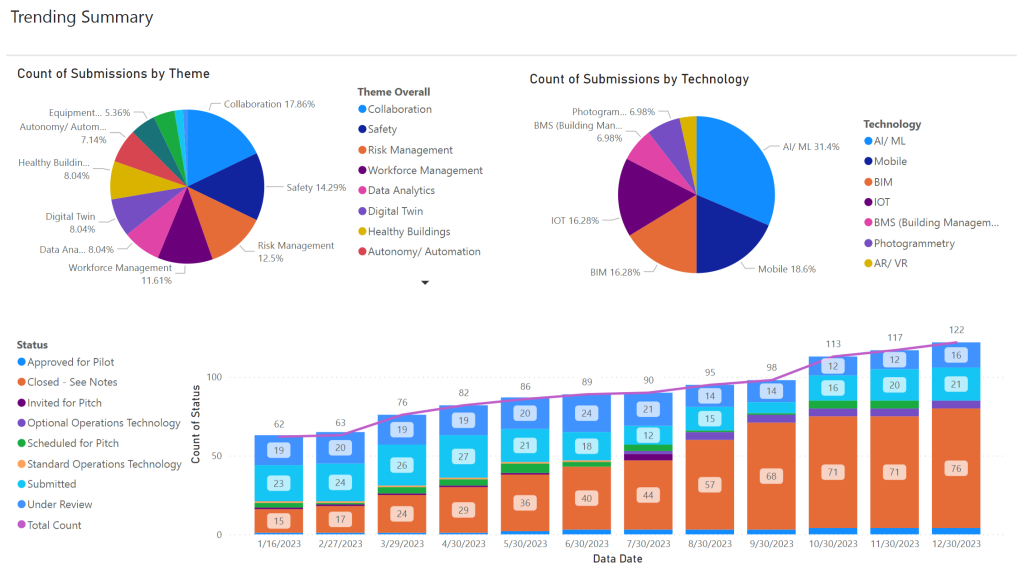A new approach to evaluating emerging technologies
What is the Spark Team?
The “Spark Team” plays a pivotal role in Gilbane’s efforts to drive innovation and operational efficiency. This group not only fosters better engagement in the industry ecosystem but also supports a disciplined approach to evaluating technology solutions for our teams. This approach helps us with exploiting our existing platforms with the goal of limiting the number of point solutions and driving more adoption – while also preparing Gilbane for the future to review and understand emerging technology options of the future.
Composition of the Spark Team
The Spark comprises a diverse team of people representative of various functions, positions, and perspectives from across the enterprise. From human resources and finance to the technology group, this group brings together expertise from different domains. Crucially, this team has field and operational representation, including operations managers and superintendents.
Streamlining & Maintaining Consistency
The goal of the Spark Team is to not only streamline efforts around the business’ existing technology stack but also maintain consistency in Gilbane’s standard operating procedures from start-up to execution when embarking on a new technology venture. The overall goal is to encourage more efficient operations across the enterprise for the most streamlined technology solutions on our project sites and in our offices.
When does the Spark Team get Involved?
Wondering how external companies engage with the Spark Team?
- External Companies Interested in Collaboration: When companies pitch an up-and-coming or existing technology to Gilbane, they have a clearly defined space to share their idea with the Spark Team.
- Submitting an Application: The Spark team directs the company to our “Innovate with Us” section of the website. There, the company submits a short application.
- Review Process: All submissions are meticulously reviewed by the Spark Team. Their insights and assessments are documented in an internally accessible Emerging Tech Log.
- Opportunity to Pitch: Companies with promising technologies that have the potential to positively impact Gilbane’s processes will have the opportunity to pitch their products to the Spark Team by providing demonstrations and case studies.
What does the evaluation process look like?
The Spark Team bases company evaluations on several factors, including:
- Problem Solving Alignment. Are they offering a solution to a problem we don’t have? For us to run a pilot with a company, they must be solving a problem of ours. We are hyper focused on the most impactful solutions for our teams that align with our enterprise strategy and objectives.
- Tech Stack Compatibility. Is there an overlap with an existing tool in our toolbelt? If so, do we need multiple options? Does it offer greater functionality than our current offering?
- Funding. Is this company and its technology still at the seed funding stage, or are they at series A, B, or C? Knowing a company’s financial viability is critical to ensure we are not putting Gilbane and potentially, our data at risk.
- Capacity Assessment. Does this company have the capacity to support the needs of a multi-billion-dollar business like Gilbane?
- Leveraging the Innovative Ecosystem. We prioritize staying connected with external innovation entities such as venture capital firms to ensure we’re leveraging those relationships and getting additional first-hand experiences from users outside of Gilbane for some of these companies. We leverage these connections to inform our priorities and build on additional knowledge and perspectives.
- Cybersecurity. Companies’ security certifications and cloud-based infrastructure are scrutinized. Protecting our information remains the top priority.
Active Pilots and Trends
The Spark Team convenes regularly for pitch meetings, evaluating different companies or vendors during each session. The team has been very strategic in its selection, selecting a small pool of pilot projects to move forward with.
As this program has been developed further, we’ve begun to see recurring trends. For example, the most common submission type we have seen falls under the theme of communication improvement, with safety coming in second, and risk management third. From a technology standpoint, Artificial Intelligence (AI) and Machine Learning (ML) have been the most common theme submitted. We are also exploring and experimenting in the Generative AI area (the new horizon of AI) and have completed some Proof of Concepts showing great efficiencies and return on investment that can position our teams for the highest and best use of their time.

As submissions pour in, the Spark team actively engages with each vendor to obtain all necessary information. One by one, we review each company/vendor and communicate future plans with them. With each closed submission, we have maintained a positive line of communication between the Spark Team and the vendors so that we don’t lose touch with any future developments these companies may have.
Outlook
Our goal going forward is to stay at the forefront of digital transformation, working to ensure our team members are provided with the most up-to-date, relevant, and innovative tools to do their jobs. In summary, the Spark Team embodies Gilbane’s commitment to innovation and strategic technology adoption. By bridging expertise and fostering collaboration, the Spark Team helps propel us toward a future where emerging technologies are harnessed effectively.

